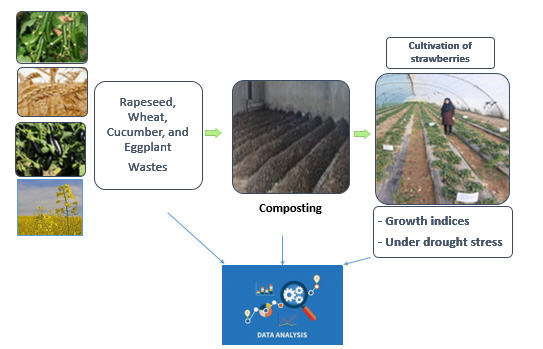
This research was conducted to investigate the possibility of producing compost from the residues of rapeseed, wheat, cucumber, and eggplant and evaluate the effect of biocompost produced and enriched with zinc and manganese on strawberry vegetative growth indices under drought stress. For this purpose, five treatments including one treatment with an equal mixture of produced biocomposts and four separate treatments of biocompost arisen from the residues of the studied plants enriched with zinc and manganese elements at a rate of 1 kg per square meter in all treatments under drought stress of 65% in a completely randomized design with three replications in greenhouse conditions were studied. The research results showed a significant difference at the levels of 1% and 5% in terms of vegetative growth indices including plant height, internode distance, fresh and dry weight of the plant, stalk diameter, and the number of strawberry tillers. In such a way that the highest amount of vegetative growth characteristics in strawberry bush was related to the treatment containing rapeseed–enriched biocompost under drought stress, and the lowest amount of them was related to the treatment containing an equal combination of biocompost from green cucumber, wheat, rapeseed, and eggplant. The analysis of variance results showed that the effect of biocomposts produced and enriched with elements of zinc and manganese under drought stress in treatments T1 (equal mixture of produced biocomposts) and T2 (biocompost produced from residues of wheat plant) and T5 (biocompost produced from residues of rapeseed plant) on strawberry vegetative growth indices was statistically significant. In such a way that the difference was observed at a level of 1% for all three aforesaid treatments in terms of plant height and the difference was observed at a level of 5 % for other vegetative characteristics (internode distance, fresh and dry weight of the plant, stalk diameter, and the number of tillers and fresh and dry weight of the root). The results indicated that the use of biocompost remain the positive effects on strawberry vegetative growth indices, and biocomposts produced individually (not combined) may be used under drought stress to improve the performance of strawberry vegetative growth.
Total file downloads: 28